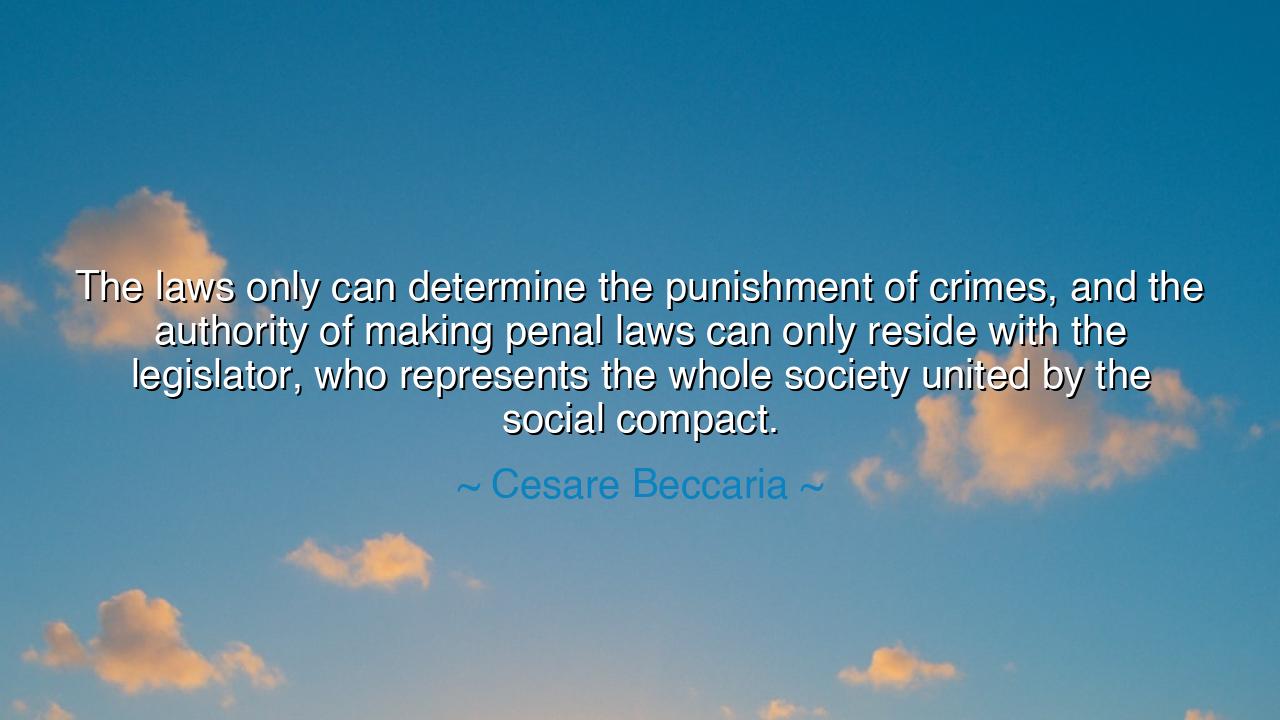
The laws only can determine the punishment of crimes, and the
The laws only can determine the punishment of crimes, and the authority of making penal laws can only reside with the legislator, who represents the whole society united by the social compact.






Hear the words of Cesare Beccaria, the voice of reason in an age of cruelty: “The laws only can determine the punishment of crimes, and the authority of making penal laws can only reside with the legislator, who represents the whole society united by the social compact.” These are not idle reflections, but the foundation of justice itself. Beccaria reminds us that punishment must never be born of vengeance, nor decreed by the whims of rulers, but only by laws, crafted with the consent of the people. For where law is absent, tyranny reigns; but where law is sacred, society stands united.
The origin of this thought lies in Beccaria’s great work, On Crimes and Punishments (1764), written in the Enlightenment, when torture and arbitrary justice were still the tools of kings. He looked upon dungeons where men were broken not by guilt but by suspicion, and gallows where punishments were handed down not by law but by caprice. Out of this darkness, he declared that only the legislator, chosen to represent the social compact, has the right to set punishments. For law must be the will of all, not the weapon of the few.
The ancients too bore witness to this truth. In the early Roman Republic, laws were written on the Twelve Tables and displayed in public for all to see. No man could be punished by secret command; the people demanded to know the law by which they lived. When law was transparent and shared, Rome was strong. But when emperors later claimed the power to punish at will, justice decayed, and the empire staggered into tyranny. Beccaria’s words are the echo of Rome’s lesson: justice belongs to the people through law, not to the whim of the powerful.
History offers another tale in the tragedy of the French Revolution’s Reign of Terror. At first, the people rose for liberty and equality, to craft a society bound by a new compact. But soon, vengeance replaced law, and the guillotine claimed thousands not by impartial judgment, but by suspicion and fear. Here the absence of Beccaria’s wisdom is plain: without laws to restrain punishment, violence devours even its own architects. Only when law reigns, impartial and grounded in the social compact, can justice prevail.
The meaning of this quote is therefore profound: laws are the shield of the people, and only through them can punishment be just. To allow rulers, mobs, or individuals to determine penalties is to return to the chaos of vengeance. But when punishment is set by legislators—those who represent the whole body of society—then it becomes not the act of the strong against the weak, but the agreement of all to preserve peace and order. The social compact is the covenant by which people surrender private vengeance, trusting instead in laws that are fair, public, and shared.
What lesson shall we, who hear these words, carry into our lives? That justice must never be arbitrary. We must guard against leaders who would bend law for their own ends, against mobs who would replace courts with torches, against the slow decay of rights in the name of expedience. We must hold our legislators accountable, demanding that they reflect not the will of the few, but the unity of the whole. For the law is not perfect, but it is the only safeguard that prevents society from collapsing into cruelty.
Therefore, children of the future, engrave this wisdom upon your hearts: only laws, born of the social compact, may determine punishment. Trust not in the passion of vengeance, nor in the hand of the tyrant. Trust instead in the covenant of society, which binds all with fairness. Strengthen your laws with reason, make them transparent, and hold those who craft them to the highest standard. For in doing so, you preserve not only justice but the very fabric of civilization, and you pass to your descendants a society where fairness endures and tyranny cannot thrive.






AAdministratorAdministrator
Welcome, honored guests. Please leave a comment, we will respond soon